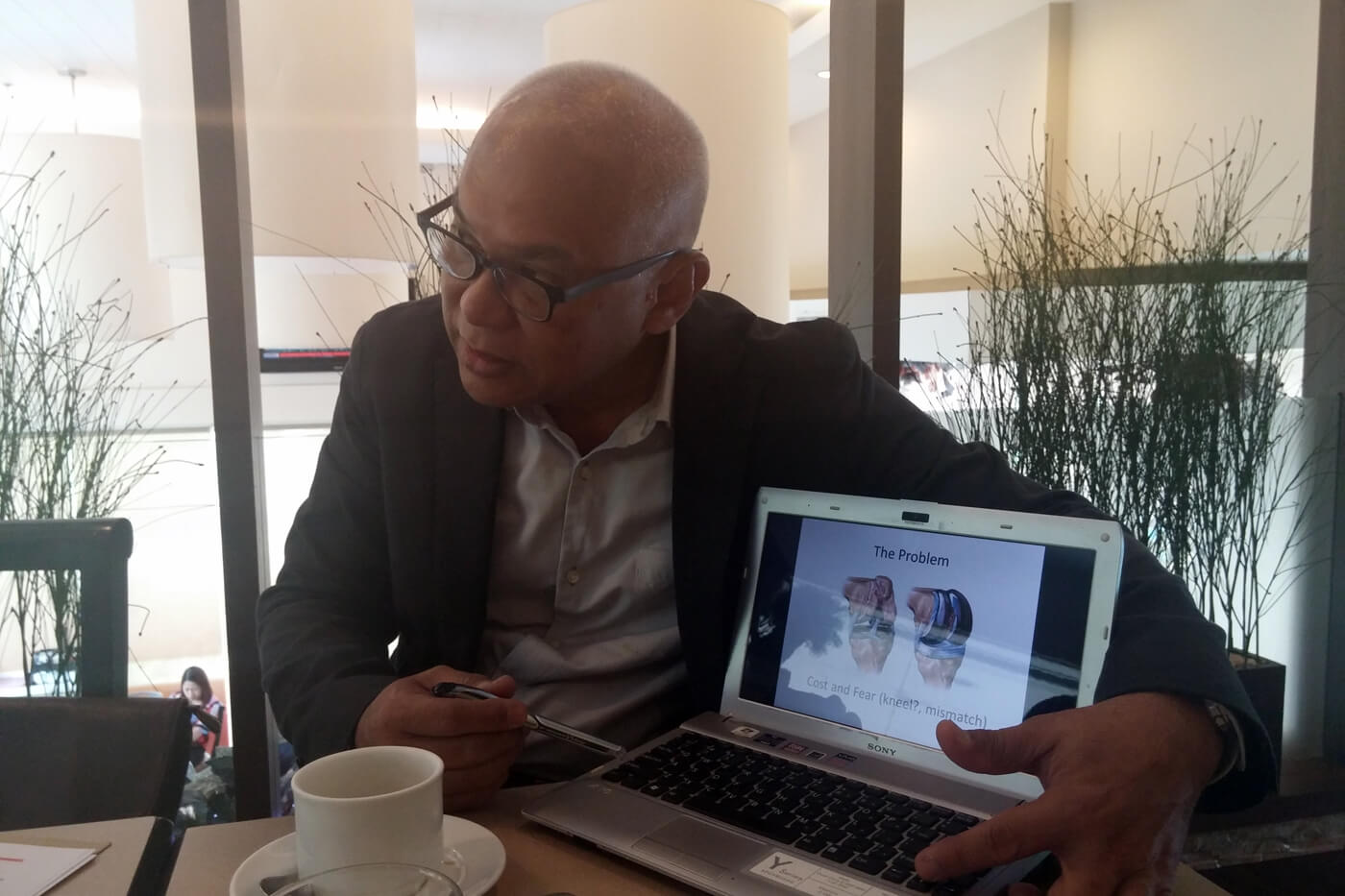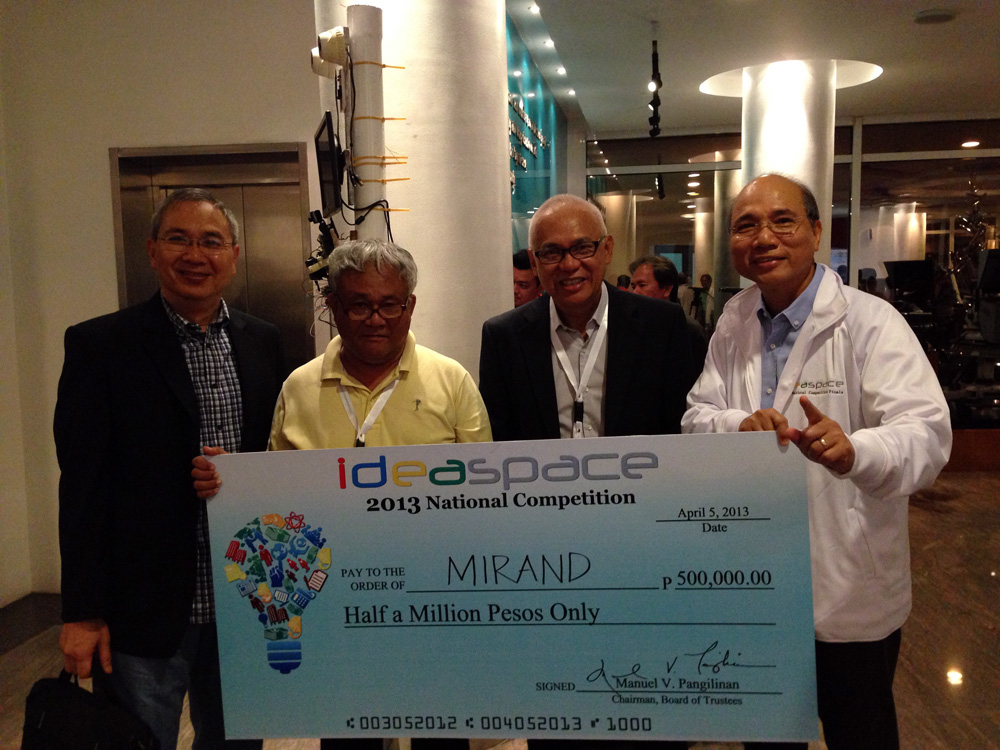When orthopedic surgeon Dr. Rene Catan introduced to his fellow doctors some years back his plan to manufacture a local joint replacement, it was dismissed as a “backyard project.” When he presented it to a group of physicians last week, they snapped up shares, even at P12,000 apiece, of the company he built to bring his idea to life.
The difference? Catan won last year a nationwide competition for startup ideas conducted by the IdeaSpace Foundation, the largest privately-backed technology incubator in the Philippines. IdeaSpace has a P500-million fund for five years, pooled together from the resources of Manuel V. Pangilinan’s group of companies.
Catan’s project was borne out of frustration — of the increasing number of people who need joint replacements every year, only about two percent get it because the process is expensive. Parts for the total knee replacement can cost up to P150,000, not counting the costs of the procedure, medicines and other related expenses.
The Cebuano doctor designed a knee replacement that will be manufactured in the Philippines. When he shared his idea with other doctors, most were skeptical and dismissive. One smirked and scoffed at the idea of the Philippines manufacturing such a medical product.

PAIN POINT, LITERALLY. Dr. Rene Catan talks about his product – a locally-designed and manufactured knee replacement. (Photo by Max Limpag)
After he won the IdeaSpace competition, where his team of doctors was the oldest and most applauded in a field composed of hackers and geeks young enough to be their children, Catan was able to move forward with his idea.
Now valued at P250 million
The company he founded, Arthrologic, is now valued by a third-party company at P250 million, he said in an interview last week. Word is quickly spreading around. Catan said doctors approached him the day after his presentation in Cebu to ask why he did not invite them to his briefing for potential new investors.
“We are not just making and selling the part,” said Catan, “we are assisting with the entire process from planning, pre-operation, surgery, post-operation and physical therapy.”
And from four hours of surgery needed for traditional imported prostheses, Arthrologic’s replacement only requires one-and-a-half hours. It also offers quicker recovery with patients able to go home, walking he said, after a few days.
The biggest benefits are the 50 percent cut in the cost of prostheses and the better quality of living after the operation because the parts were designed to fit Asians. With traditional replacements, Catan said “we have been putting oblong prostheses in circular knees.” This explained why some would still complain of pains after undergoing surgeries.
“Better fit, better range of motion”
Since he designed his knee replacement with fewer parts and on an Asian physique, the quality of movement is good. Their solution offers “better fit and a better range of motion.”
“Part of their fear is whether they could still kneel or squat. Squatting is not an activity that’s common among Caucasians,” he said, “Our patients should be able to squat and kneel like those with natural knees.”
His demo video showed an old woman with bent legs, walking or dragging her feet in pain because of severe osteoarthritis. He said the woman, who used to work as a seamstress but was forced to turn to running a sari-sari store to make a living because of the disease, wouldn’t have been able to afford the traditional joint replacement. Catan’s after-surgery photo is of the woman joining a Zumba class.
“We are in the business of improving lives by restoring mobility,” he said.
“Doctors are excited”
He said an estimated 80,000 Filipinos have osteoarthritis so severe they need surgery. But every year, only 1,500 surgeries are performed. Catan said his company hopes to help bridge that gap with their solution. They have so far used it on 18 patients and the feedback has been very good. “The doctors are excited,” he said.
Catan said they are looking to go beyond the country. Joint replacements are a $30-billion global market because of the epidemic of osteoarthritis with an aging population. Catan said that what was crucial to his idea moving forward was the backing of the IdeaSpace Foundation. Apart from seed funding and incubation support, the foundation’s network of companies provided legitimacy to his project.
In an interview after they were announced winners last year, Catan said their experience showed that “it’s never too late to chase your dreams.” He encouraged those with startup ideas to pursue these.
IdeaSpace, meanwhile, is currently accepting applications until January 15 for the next round of ideas that will be supported. Goldy Yancha, of IdeaSpace community development, said they already received about 300 submissions as of last week. She advised those who will be sending applications to closely look into market need of their ideas, saying this is key in the selection.
“We are particular on impact — it’s all about nation-building. Nation building by empowering people to run businesses, creating productivity and profit in the country and creating jobs,” Yancha said.
The post IdeaSpace Foundation looks for ‘next big idea’ appeared first on Leon Kilat : The Tech Experiments.
